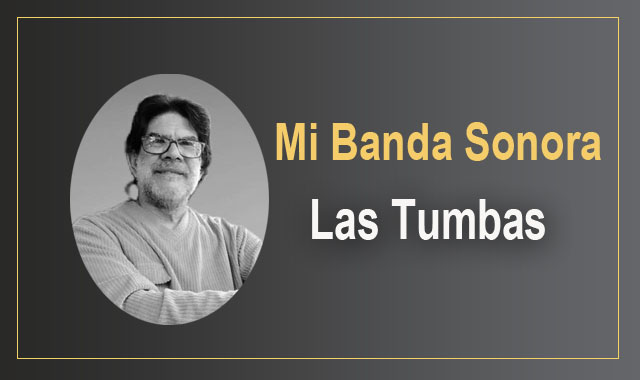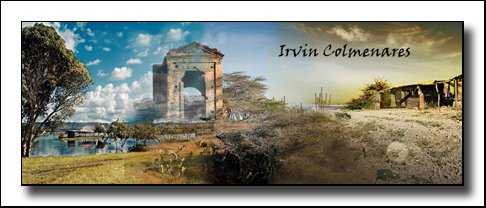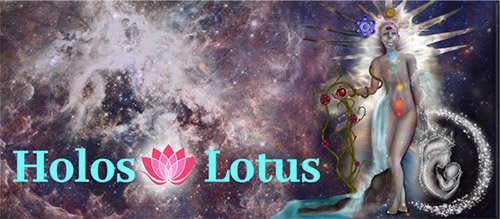Mi Banda Sonora. Las Tumbas | My Soundtrack. Las Tumbas

No recuerdo exactamente por donde me llegó la invitación. Debió haber sido por boca de Daniel, un amigo del barrio, unos diez años mayor que yo, y que trabajaba como asistente en un centro de rehabilitación para personas con problemas de drogas en el Este de la ciudad.
Sí me pareció raro el sitio convocado para la reunión, en la Casa Parroquial de una iglesia del Oeste. Seguramente que el párroco a cargo había sido tocado en su corazón por ese invento latinoamericano conocido como “Teología de la Liberación”, que produjo un gran sacudón al interior de la Iglesia Católica mundial.
De otro modo no creo que se permitiera, que en aquellos espacios revestidos de sacralidad, se reunieran un grupo de jóvenes, con cabezas calenturientas, a recibir clases de un catecismo distinto llamado marxismo-leninismo.
Porque en aquellas reuniones lo que hacíamos era recibir ese otro catecismo, el marxismo-leninismo, que todavía en aquella Caracas de los años setenta entusiasmaba a muchachos ingenuos como yo.
Las reuniones las conducía un hombre joven que recibía terapias en el centro de rehabilitación. Pocos años atrás él había vivido en Francia, haciendo estudios universitarios en el tiempo del famoso “Mayo Francés”. Allí fue donde quedó enganchado a la heroína y ahora trataba en Caracas de salir de eso. Era probable que las clases de marxismo que generosamente nos daba formaran parte de lo que ahora llamamos terapia ocupacional.

Debo decir que Andrés, como se llamaba aquel hombre, era una persona muy amable, cariñosa, con una gran facilidad para explicar las cosas. Tenía un don especial para que aquel montón de truculencias ideológicas sonaran no solo creíbles sino también deseables.
El grupo era bastante homogéneo, casi todos éramos estudiantes. El único universitario era yo que me estaba iniciando en el Pedagógico de Caracas. Los demás, unos doce o quince, eran muchachos de los últimos años del bachillerato, reclutados por los grupos de la izquierda radical en los liceos del Oeste.
Yo prestaba mucha atención a lo que comentaba Andrés, todo aquello era una completa novedad, nunca antes había escuchado hablar sobre esos temas. Pero era inevitable que también me fijara en las muchachas del grupo, sobre todo en una, que aunque muy joven, parecía saber mucho más que los demás. Susana, era su nombre.
A veces Susana y Andrés se enfrascaban en profundas discusiones donde argumentos de todos los calibres salían en defensa de lo que cada uno pensaba. Yo los veía y escuchaba hipnotizado.
Muchas tardes, al terminar la reunión, me quedaba hablando con Susana y hasta la acompañaba hasta la parada donde tomaría el bus para su casa.
En una oportunidad me preguntó si me gustaba la Salsa, le dije que más o menos, que un poco más el Rock.

¡El rock…!, dijo Susana, como si estuviera oyendo alguna blasfemia.
¡Eso lo tenemos que arreglar…! Agregó a continuación.
¡Tienes que venir a reunirte con nosotros…! Para que te culturices, jajajaja, decía mientras anotaba algo en un papel. Y se montó en el autobús, dejando en mi mano un pequeño trozo de papel garabateado e impregnado todavía de su olor especial.
En el papel estaba la dirección de una casa que me fue fácil ubicar, era subiendo por Gato Negro, a unas tres cuadras de la Avenida Sucre. Además, incluía fecha y hora.
El día de la reunión tuve que jubilarme de una de mis clases del Pedagógico, recuerdo que era la clase de Inglés, lo que no me causo remordimiento porque era bastante aventajado en esa materia.
Llegué puntual a la casa de Gato Negro, era una vivienda humilde, de dos plantas, en la que la planta superior estaba todavía sin frisar, con el bloque desnudo. En la acera estaban varios muchachos de los que asistían a la Casa Parroquial, les pregunté por Susana y me dijeron que no había llegado, que con ella nunca se sabía a qué hora llegaría.
Pasé con ellos y me ofrecieron guarapita de la que estaban tomando, les dije que no. ¡Este bicho como que es raro…! Comentó uno de ellos y se fue a servir su trago. De fondo se escuchaba una música muy alegre en la que pude distinguir nítidamente el sonido del trombón acompañado de una gran voz, era la primera vez que la escuchaba. Con mucha pena le pregunté al que tenía al lado quién era ese que sonaba tan bien. ¿No lo conoces…? Me dijo extrañado, como si estuviésemos hablando del agua o el aire. Es Willie Colón, me dijo, El Malo, de su primer disco. El cantante era Héctor Lavoe.
Allí pasé toda la tarde escuchando una música que no conocía, Susana no se presentó esa tarde.
Pero en las tardes siguientes si fue, Susana me fue instruyendo en esa potente música desconocida para mí. Paso a paso me hice asiduo de aquellas reuniones en Gato Negro donde se bailaba y se escuchaba música, que lograron sobrevivir mucho más tiempo que las de la casa parroquial, y que dejaron en mi alma un aprendizaje de mayor calado y valor.
Seguramente que fue con aquellos muchachos cuando escuché por primera vez a Ismael Rivera, con su manera particular de cantar, con ese estilo único para meter el Son en lo más profundo de la piel.
La canción que les comparto hoy, “Las Tumbas”, también tiene su historia.
Corría el año 1962 e Ismael Rivera formaba parte de la famosa banda “Cortijo y su Combo”, donde brillaba como cantante. Al llegar a Puerto Rico fue detenido por posesión de drogas.
Según algunas informaciones de internet la Banda y él estaban de regreso de Venezuela, donde habían hecho una serie de presentaciones con motivo de las fiestas de carnaval en los clubes más prestigiosos de la Capital Venezolana.
Al parecer el avión hizo escala en Panamá y fue allí donde compraron las drogas para uso del cantante. Luego al llegar al aeropuerto de San Juan, fueron apresados por la policía.
Por aquel entonces ya Puerto Rico se regía por las leyes norteamericanas, así que un juez decidió que el cantante debía pagar cuatro años de rehabilitación, en régimen carcelario, en el centro de rehabilitación de Lexington, Kentucky.
En esos largos cuatro años fue visitado por su amigo Bobby Capó, también puertorriqueño cómo él. Un célebre cantante y autor quien había sido su mentor para colocarlo en la movida de la música latina en Nueva York.
En aquellas conversaciones Ismael Rivera le hablaba a Capó sobre el infierno que vivía en aquella cárcel norteamericana. Las imágenes seguramente que quedaron rondando en la mente del compositor hasta que encontraron el momento de emerger unos cuantos años más tarde. En el año 75 Ismael Rivera añadió a su lista de éxitos este gran tema compuesto por el también grande Bobby Capó.
Es probable que muchos de ustedes hayan escuchado la canción. Si no, los invito a que le dediquen unos minutos.
Gracias por tu tiempo.


I don't remember exactly how I got the invitation. It must have been through Daniel, a friend from the neighborhood, about ten years older than me, who worked as an assistant at a rehabilitation center for people with drug problems in the east of the city.
I did find the location of the meeting strange, in the parish house of a church in the west. Surely the parish priest in charge had been touched in his heart by that Latin American invention known as “Liberation Theology,” which caused a great upheaval within the Catholic Church worldwide.
Otherwise, I don't think he would have allowed a group of hot-headed young people to gather in those sacred spaces to receive lessons in a different catechism called Marxism-Leninism.
Because in those meetings, what we did was receive that other catechism, Marxism-Leninism, which even in Caracas in the 1970s still excited naive young people like me.
The meetings were led by a young man who was receiving therapy at the rehabilitation center. A few years earlier, he had lived in France, studying at university during the famous “French May.” That was where he became hooked on heroin, and now he was trying to get off it in Caracas. It is likely that the Marxism classes he generously gave us were part of what we now call occupational therapy.
I must say that Andrés, as the man was called, was a very kind, affectionate person with a great ability to explain things. He had a special gift for making that pile of ideological truculence sound not only credible but also desirable.

The group was fairly homogeneous; almost all of us were students. The only university student was me, who was just starting out at the Pedagogical University of Caracas. The others, about twelve or fifteen, were high school seniors, recruited by radical leftist groups in the western high schools.
I paid close attention to what Andrés said; it was all completely new to me, I had never heard anyone talk about these topics before. But it was inevitable that I would also notice the girls in the group, especially one who, although very young, seemed to know much more than the others. Her name was Susana.
Sometimes Susana and Andrés would engage in deep discussions where arguments of all kinds were put forward in defense of what each one thought. I watched and listened, mesmerized.
Many afternoons, after the meeting ended, I would stay and talk with Susana and even accompany her to the bus stop where she would take the bus home.
On one occasion, she asked me if I liked salsa. I told her that I liked it, but that I liked rock a little more.
“Rock music...!” said Susana, as if she had heard some kind of blasphemy.
“We have to fix that...!” she added. “You have to come and meet us...! So you can become more cultured, ha ha ha,” she said as she wrote something down on a piece of paper. And she got on the bus, leaving me with a small piece of paper covered in scribbles and still impregnated with her special scent.

On the paper was the address of a house that was easy for me to find, up Gato Negro, about three blocks from Sucre Avenue. It also included the date and time.
On the day of the meeting, I had to skip one of my teaching classes. I remember it was English class, which didn't bother me because I was pretty good at that subject.
I arrived on time at the house on Gato Negro. It was a modest two-story house, with the upper floor still unfinished, the concrete exposed. On the sidewalk were several boys who attended the parish house. I asked them about Susana, and they told me she hadn't arrived yet, that with her you never knew what time she would show up.
I walked past them, and they offered me some guarapita they were drinking, but I said no. “This guy is weird...” one of them commented and went to pour himself a drink. In the background, I could hear very cheerful music in which I could clearly distinguish the sound of the trombone accompanied by a great voice. It was the first time I had heard it. With great sadness, I asked the person next to me who that person was who sounded so good. “Don't you know him...?” he said, surprised, as if we were talking about water or air. “It's Willie Colón,” he said, “El Malo, from his first album. The singer was Héctor Lavoe.”
I spent the whole afternoon there listening to music I didn't know. Susana didn't show up that afternoon.
But she did come the following afternoons, and Susana taught me about this powerful music that was unknown to me. Step by step, I became a regular at those gatherings at Gato Negro, which managed to survive much longer than those at the parish house and left a deeper and more valuable lesson in my soul.
It was probably with those guys that I first heard Ismael Rivera, with his particular way of singing, with that unique style of getting Son deep under your skin.
The song I am sharing with you today, “Las Tumbas,” also has its own story.
It was 1962, and Ismael Rivera was part of the famous band “Cortijo y su Combo,” where he shone as a singer. Upon arriving in Puerto Rico, he was arrested for drug possession.
According to some information on the internet, the band and he were returning from Venezuela, where they had done a series of performances for the carnival celebrations in the most prestigious clubs in the Venezuelan capital.
Apparently, the plane made a stopover in Panama, and it was there that they bought the drugs for the singer's use. Then, upon arriving at the San Juan airport, they were arrested by the police.
At that time, Puerto Rico was already governed by US law, so a judge decided that the singer should serve four years of rehabilitation in prison at the Lexington, Kentucky, rehabilitation center.
During those long four years, he was visited by his friend Bobby Capó, also Puerto Rican like him. A famous singer and songwriter who had been his mentor in getting him into the Latin music scene in New York.
In those conversations, Ismael Rivera told Capó about the hell he was going through in that US prison. The images surely lingered in the composer's mind until they found their way out a few years later. In 1975, Ismael Rivera added this great song, composed by the equally great Bobby Capó, to his list of hits.
Many of you have probably heard the song. If not, I invite you to take a few minutes to listen to it.
Thank you for your time.
Translated with DeepL.com (free version).








Comunidad Be Entrepreneur

Congratulations @irvinc! You have completed the following achievement on the Hive blockchain And have been rewarded with New badge(s)
Your next target is to reach 17000 comments.
You can view your badges on your board and compare yourself to others in the Ranking
If you no longer want to receive notifications, reply to this comment with the word
STOPThank you so much my dear friend.
You're making a big impact @irvinc! Keep up the fantastic work and you'll reach your Hive target in no time.
Do you want to get involved? Do you want to support music and this project? Follow us to keep you updated and read our Introduction post!
🎶 Join us on our Discord Server! 🎵
Thank you so much my dear friend.
Que grato leerte, hermano. Fue un viaje de descubrimiento sobre el Jazz latino mejor conocido como La Salsa. Las tumbas, recuerdo la primera vez que lo escuche. Era un niño y acostumbraba visitar a los tios, y ellos en sus tertulias siempre tenian Salsa. Me llamo la atención su lenguaje humano, social y real. Gracias por compartir tu experiencia.
Me alegra que te haya gustado la publicación. Me gusta hacer memoria sobre mi encuentro con esos temas inolvidables. Gracias por pasar y comentar estimado @yisusth. Un fuerte abrazo desde Maracay.
I love the beat of this music, its very lively and would make my sleepy feeling vanish.
Thank you so much my dear friend @ronimarie82.